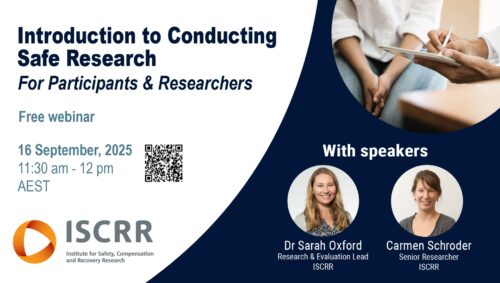
Does your research expose your participants or researchers to psychological trauma? At ISCRR, our journey toward safer research practices began with the realisation that the work we do can be traumatic for both the people we study, and for us as researchers.
Many of our interview participants are people who have already experienced trauma, such as injured workers, and we ask them to share about those experiences. Our own research into vicarious trauma made it clear that we are exposed to distressing stories and content in the course of our work. We asked ourselves: ‘How can we keep both participants and researchers safe?’ The answer lay in being proactive.
We began with a comprehensive literature review on trauma-informed practice, drawing on established approaches from other sectors. We combined this with our own findings from vicarious trauma research, applying lessons internally, such as implementing a “buddy system,” ensuring at least two researchers are assigned to each project for mutual support, and developing strategies for handling traumatic material.
We also assessed our skills and identified gaps. To strengthen our capacity, we introduced a formal distress protocol, organised whole-institute trauma-informed training, and provided the research team with suicide intervention training.
Even with these initiatives, we recognised our approach had room for improvement. Different teams were doing different things, and there was no unified framework to guide safe practice. This insight led us to formalise our efforts into two key resources: the Conducting Safe Research Guideline and the Safe Interview Protocol. These documents ensure that safety measures are consistent across all projects and that no aspect of participant or researcher wellbeing is overlooked.
Our learning is ongoing as we continue to monitor and adapt our policies, as our practice and research evolves. By embedding these principles into the core of our work, ISCRR has created a safer, more supportive environment, one where important research can be conducted without compromising the wellbeing of anyone involved.
If you would like to learn more about our story and how you can adopt an organisation-wide approach to psychologically safe research practices, register for our free webinar Conducting safe research for participants and researchers on Tuesday 16 September 2025 at 11:30am (AEST).
